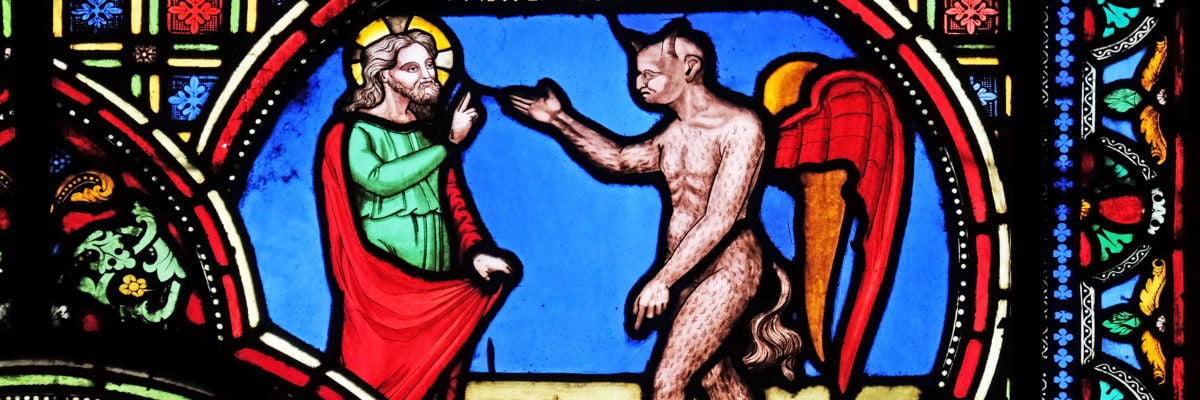
Homily for the First Sunday of Lent, 2021
The Spirit drove Jesus out into the desert,
and he remained in the desert for forty days,
tempted by Satan.
He was among wild beasts,
and the angels ministered to him.-Mark 1:12-15
We might call this Sunday the Feast of the Lord’s Temptation, since every year the Gospel for the first Sunday of Lent, in both forms of the Roman rite, presents this mystery of our faith.
If you were praying the rosary, you would include this amazing event in the third Luminous mystery, which regards Our Lord’s ministry after his baptism.
Of all the Gospels, St. Mark’s has the briefest account of the Lord’s temptation in the desert. Even so, his way of describing the scene, so stripped down to its essentials, gives it a sense of cosmic grandeur: God the Holy Spirit; the vast desert of this earth in which Jesus the New Adam is tempted by Satan instead of in a garden of delight; brutes who are beneath man by nature, and angels who are above him by nature and yet serve man because of Christ’s redemption; all these summarize the horizons of reality. We could say that each one of us is a pilgrim led by the Spirit through the desert of this passing life, tried by the Evil One and assisted by God’s holy ones until we finally have the victory in Christ.
There are a number of reasons why the Lord Jesus accepted to be tempted by the devil. We have written of them in homilies for the past few years, and you can find these easily. But this year we offer a truly inspiring and encouraging, but also challenging, explanation for why the devil would tempt the Savior—or any man, woman, or child.
The matter is quite simple. The devils do not tempt us primarily because we are weak sinners and are more than likely to fall. He is too evil just to be a bully. No, it’s because he perceives that human beings—any human being, but especially those who are in God’s grace and those who have the effects of Christ’s sacraments in their souls—are superior to him, are due greater honor than him, and occupy higher places than his in the whole universe created by God. He cannot bear this humiliation, and so he does what he can to drag us down into sin.
St. John Chrysostom tells us:
God allows that we should be tempted for many other reasons, yet for this cause also he allows it, that we may know, that man when tempted is placed in a station of greater honor. For the devil does not approach except where he has seen someone set in a place of greater honor.
The problem for the devil is that he is always going to be defeated in tempting us, since even if we fall, we still can be given the grace of repentance and forgiveness. We still have an eternal advantage that he does not have. He is always foiled; he never wins in the end.
So we should recognize, even when we feel very weak and prone to give in, whether in small matters or great ones, that we are only being tempted by the devil because we are greater in dignity than he. To be sure, his nature as a pure spirit is more noble than ours, but our destiny is to fill the places of the fallen angels in the kingdom of heaven. This means that in the final account we will reign and rejoice, and he will not.
Being tempted by the devil means that we are more powerful than we realize, because of Christ. So when we are tempted, we should call upon his power, his precious blood, his mother and the holy angels, to come to our aid. And if we fall, we should immediately do powerful things—that is, make an act of contrition out of love for God, and get to confession. (And don’t forget holy water, which reminds the devil of baptism, so that he flees in shame.) Remember that the sacred liturgy tells us that God shows his almighty power most of all by his showing mercy.
In tempting us, the devil only shows his envy and frustration. In resisting him, or in seeking pardon when we don’t, we show the great good we already possess. We also show the peace of knowing that we will be forgiven yet again and go on to struggle one day at a time until that happy hour when we pass from our wandering Lent in the desert of this life into the Promised Land of bliss.
And there, not only the angels, but Jesus himself will “minister to us.” Glory to the Savior, victorious over temptation for our sake. Let us put all our trust in him!



